
In the first nine months of the 2023-2024 marketing year (MY), Kernel Agro Holding exported 1 million tons of sunflower oil in bulk to almost 30 countries, the company’s press service reported on Facebook.
“We remain the largest agricultural exporter of sunflower oil and are among the TOP-3 total exports of Ukraine,” the statement said.
According to the agroholding, about 50% of the total volume of sunflower oil was supplied to India, 8% to the UAE, 7% to China and Spain, 5% to Italy, and 2% to Iraq, Singapore, Switzerland, Turkey, and Hong Kong.
“To expand the export opportunities of the entire industry, last year we started offering our infrastructure capacities to other agricultural producers in the market. At the company’s terminals in Odesa region, we provide transshipment services for grain crops and vegetable oil,” Kernel said.
In addition, the agricultural holding is completing the construction of one of the largest oil extraction plants in Europe in Starokonstantinov, Khmelnytsky region. Its processing capacity will be 1 million tons of seeds per year.
“This will allow us to increase the export of vegetable oil, a value-added product, and support agricultural producers in the region by providing them with opportunities to sell their products,” the agricultural holding explained.
As reported, Kernel processed 816 thsd tonnes of sunflower seeds in the third quarter of fiscal year (FY) 2024, up 10% year-on-year.
At the same time, sales of sunflower oil in January-March 2024 increased by 44% year-on-year to 394 thsd tonnes, totaling 1,103 thsd tonnes in the first nine months of 2024.
Before the war, Kernel Agro Holding was the world’s leading producer of sunflower oil (approximately 7% of global production) and its exports (approximately 12%). It is one of the largest producers and sellers of bottled oil in Ukraine. In addition, it is engaged in the cultivation and sale of agricultural products.
Kernel’s net profit for FY2023 amounted to $299 million, while the company ended the previous year with a net loss of $41 million. The agricultural holding’s revenue for FY2023 decreased by 35% to $3.455 billion, but EBITDA increased 2.5 times to $544 million.
In the first half of FY2024, Kernel’s net profit fell 3.6 times compared to the first half of FY2023, to $102 million, and EBITDA halved to $223 million, with revenue down 16% to $1.59 billion.
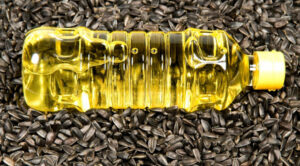
In the third quarter of fiscal year 2024, Kernel processed 816 thousand tons of sunflower seeds, up 10% year-on-year.
According to the company’s announcement on the Warsaw Stock Exchange on Tuesday, six crushing plants of the agricultural holding operated at almost full capacity, while two plants were idle due to the proximity to the Russian border and the war zone.
In addition, at the end of February, Kernel started commissioning the Starokonstantinovka oilseed processing plant in Khmelnytsky region. At the time of writing, the plant has reached over 90% of its processing capacity at the commissioning stage. The plant is expected to be fully operational by May 2024 and reach its maximum processing capacity of 1 million tons of sunflower seeds annually.
At the same time, sales of sunflower oil in January-March 2024 increased by 44% year-on-year to 394 thsd tonnes, totaling 1,103 thsd tonnes in 9M2024.
Sales of bottled sunflower oil in the third quarter of FY2024 amounted to 5% of total sales (19 thousand tons).
Kernel emphasized that the volume of loading of the group’s granaries in the third quarter of fiscal year 2024 was at a seasonally low level – 254 thousand tons, which amounted to 2.7 million tons for 9 months of fiscal year 2024, which corresponds to the same period last year.
The export terminal’s transshipment volume for the reporting period increased to 2,464 thsd tonnes of grain, sunflower oil and meal, which showed a 2.3-fold increase. This was driven by consistent export activity via the Black Sea, increased volumes of sunflower oil produced, transshipment through port terminals acquired earlier in the season, along with the provision of transshipment services to third parties.
Despite the high transshipment volumes of the terminals, the volume of grain exports from Ukraine in January-March amounted to 1.877 thousand tons, which is 2.3 times more than in the same period last year, the company stated.
Before the war, Kernel Agro Holding was the world’s leading producer of sunflower oil (approximately 7% of global production) and its exports (approximately 12%). It is one of the largest producers and sellers of bottled oil in Ukraine. In addition, it is engaged in the cultivation and sale of agricultural products.
Kernel’s net profit for FY2023 amounted to $299 million, while the company ended the previous year with a net loss of $41 million. The agricultural holding’s revenue for FY2023 decreased by 35% to $3.455 billion, but EBITDA increased 2.5 times to $544 million.
In the first half of FY2024, Kernel’s net profit fell 3.6 times compared to the first half of FY2023, to $102 million, and EBITDA halved to $223 million, with revenue down 16% to $1.59 billion.
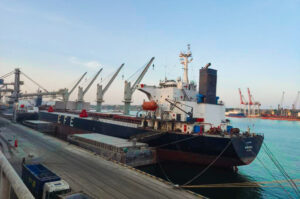
“Kernel, one of Ukraine’s largest agricultural groups, has purchased a third vessel for grain exports with a carrying capacity of more than 50,000 tons, the agricultural holding’s press service reports on Facebook.
“We have purchased a new vessel Rotterdam Pearl V, capable of exporting more than 50 thousand tons of grain. Now our fleet already includes three vessels that can export about 100 thousand tons of grain and 20 thousand tons of sunflower oil per month,” the statement said.
The company added that it continues to invest in expanding maritime logistics capabilities for the Ukrainian agricultural industry.
“Our own fleet has been providing Ukrainian exports to the Mediterranean and North-East Atlantic countries for more than a year and allows us to manage costs along the entire logistics chain. The development of our own shipping, in particular, does not force us to fix tonnage from the market, which is unprofitable during the period of inflated freight rates during martial law,” the statement said.
Before the war, Kernel Agro Holding was the world’s leading producer of sunflower oil (about 7% of global production) and its exports (about 12%). It is one of the largest producers and sellers of bottled oil in Ukraine. In addition, it is engaged in the cultivation and sale of agricultural products.
Kernel’s net profit for FY2023 amounted to $299 million, while the company ended the previous year with a net loss of $41 million. The agricultural holding’s revenue for FY2023 decreased by 35% to $3.455 billion, but EBITDA increased 2.5 times to $544 million.
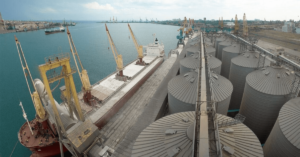
“As of March 2024, Kernel, one of the largest Ukrainian agro-industrial groups, has returned to pre-war volumes of agricultural exports by sea, said Yuriy Kizlevych, Head of the Transshipment and Fleet Department of the agricultural holding, during the online conference of the Center for Economic Strategies “Challenges at Sea and Border. What is the future of Ukraine’s foreign trade?”.
“We are investing in infrastructure. As of today, we have really returned to pre-war export volumes. During the full-scale invasion, we continued to invest in port terminals. We now own a certain cluster of terminals, both for grain and vegetable oil transshipment,” he said.
According to Mr. Kizlevych, Kernel handles not only its own agricultural products but also provides this service to other operators, which has a positive impact on the domestic market and exports.
The head of Kernel’s transshipment and fleet department noted that the agricultural holding sees prospects for increasing exports via the Black Sea sea corridor.
He also said that 70% of Kernel’s exports are to non-European destinations, including Asia, the Middle East, North Africa, and only then to Western Europe.
Speaking about the cost of logistics, Kizlevych stated that since the beginning of the war, it has had to be divided into two components: domestic and maritime. All domestic market operators have problems with the former, in particular with regard to facilities where infrastructure has been damaged.
“However, thanks to the fruitful cooperation between business and the state, we see that the best ways to solve problematic infrastructure issues are being found. Inland logistics is changing very dynamically, taking into account the existing export channels. We see that this process has become more planned and manageable, comparable to the pre-war level,” he said.
Describing Ukraine’s maritime logistics, Kizlevych confirmed the impact of the military bonus factor on the total cost of export transportation.
“Of course, there is a factor of the military premium that must be paid to shipowners for the call of ships (to the Ukrainian part of the Black Sea – IF-U). Fleet freight has become more expensive. If we look at the “grain corridor”, its first Ukrainian version, we can state huge losses in port dues for the downtime of the large-capacity fleet. These are millions, tens of millions of losses,” said the Head of Transshipment and Fleet Department of Kernel.
At the same time, he emphasized that market participants see positive dynamics in the reduction of insurance rates, which is a positive signal and gives hope for a more stable functioning of Ukraine’s sea routes in 2024.
Before the war, Kernel Agro Holding was the world’s largest producer of sunflower oil (approximately 7% of global production) and a major exporter (approximately 12%). It is one of the largest producers and sellers of bottled oil in Ukraine. In addition, it is engaged in the cultivation and sale of agricultural products.
Kernel’s net profit for FY2023 amounted to $299 million, while the company ended the previous year with a net loss of $41 million. The agricultural holding’s revenue for FY2023 decreased by 35% to $3.455 billion, but EBITDA increased 2.5 times to $544 million.
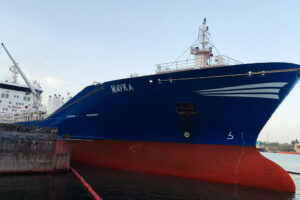
“In 2023, Kernel, one of the largest Ukrainian agro-industrial groups, strengthened its position as a port operator by acquiring a tanker, two bulk carriers and terminals for transshipment of sunflower oil in Odesa’s Pivdennyi and Chornomorsk ports and on the Danube River, said Yevhen Osypov, CEO of the agricultural holding.
“The agricultural holding has long been a port operator. We have several terminals through which we export. Over the past year, we have invested and purchased terminals for transshipment of sunflower oil. We did not have self-propelled terminals before. We used the services of partners,” he said at the Business Breakfast with Forbes Ukraine on Wednesday.
Osipov noted that the bulk of the agricultural holding’s terminals were concentrated in Mykolaiv. After losing Mykolaiv ports to the full-scale war, Kernel had to invest in new supply chains for sunflower oil to the global market and acquired terminals in Pivdennyi and Chornomorsk ports and on the Danube River to ensure exports. The agricultural holding’s SEO called the acquisition of vessels one of the elements of Kernel’s sustainable development.
“At some stage, we did not understand whether the corridor would work or not (the Black Sea Grain Initiative – IF-U), and the volumes (of agricultural products – IF-U) need to be exported. We realized that we need to invest in the fleet to ensure the possibility of export,” he said.
Mr. Osipov confirmed that Kernel currently owns one tanker and two bulk carriers, which provide the agricultural holding with 30% of sunflower oil and 20% of bulk cargo exports.
The group is currently exploring this area and has formed a new team to manage the fleet.
“These are slightly different competencies that the agricultural holding did not have before. This business is very competitive and not as simple as it seems at first glance,” admitted the SEO and added that the existing military bonus makes this business efficient.
Mr. Osipov noted that due to military risks, Kernel has not been buying new vessels and is considering investing in newer ones, although not this year – first it intends to learn how to balance with the existing fleet on the market. Currently, the agricultural holding’s fleet operates on a daily basis, delivering its agricultural products to Romania, the Mediterranean basin and Northern Europe, where it is gaining experience in shipping.
Prior to the war, Kernel was the world’s largest producer of sunflower oil (about 7% of global production) and a major exporter (about 12%). It is one of the largest producers and sellers of bottled oil in Ukraine. In addition, it is engaged in the cultivation and sale of agricultural products.
Kernel’s net profit for FY2023 amounted to $299 million, while the previous year it ended with a net loss of $41 million. The agricultural holding’s revenue for FY2023 decreased by 35% to $3.455 billion, but EBITDA increased 2.5 times to $544 million.
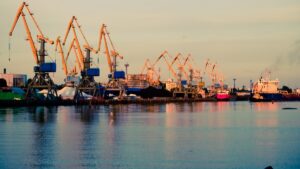
In October-December 2023, Kernel Agro Holding made additional investments to restore the transshipment of vegetable oils at the long-dormant Chornomorsk port, which it acquired in July 2023, allowing the company to start loading the first vessel with sunflower oil in January 2024.
“This was an important milestone in the revival of the company,” Kernel said in its quarterly report published on the Warsaw Stock Exchange.
It also notes that in December 2023, Kernel completed the acquisition of 100% of corporate rights in Reni-Oil LLC, a terminal in the port of Reni for transshipment of sunflower oil with a one-time storage capacity of 15 thousand tons of oil, for $24.75 million. It is indicated that this asset, located on the Danube, is important for the group, providing the ability to export sunflower oil even in the event of a blockade of the Black Sea ports.
According to the report, in December 2023, Kernel acquired a bulk carrier with a capacity of 50 thousand tons of grain, which became the third vessel in the company’s fleet and significantly expanded the group’s transportation and logistics capabilities.
In addition, in December 2023, Kernel launched the fifth cogeneration heat and power plant at one of its oil extraction plants with an installed capacity of 21 MW, which helps to increase resilience to the risk of potential power outages.
“According to the plan, the Group is working on commissioning a new modern oilseed processing plant located in Khmelnytsky region, which is scheduled to be commissioned in spring 2024. At the time of publication of this report, commissioning works have already begun. The plant with a capacity of 1 million tons of sunflower seeds per year will be the largest in Ukraine,” the document also says.
It specifies that in October-December 2023, the company spent $41 million on investments in fixed assets, including the purchase of a Supramax bunker.
As reported, in August last year, Kernel announced the purchase of vegetable oil transshipment facilities in the port of Chornomorsk for $19.4 million and a sunflower oil transshipment terminal in the port of Reni (both in Odesa region) for $24.75 million.
“The one-time storage of 105 thousand tons of sunflower oil will allow the group not to stop the operation of processing plants in case of transportation disruptions, as it was in the 2022-2023 financial years, and to smooth out logistics,” the agricultural holding commented on these acquisitions at the time. “Kernel added that the expansion of infrastructure is “vital” for the agricultural holding ahead of the commissioning of the Starokonstantinivsk oil extraction plant in Khmelnytsky region.
Kernel’s net profit for FY2023 amounted to $299 million, while the company ended the previous year with a net loss of $41 million. The agricultural holding’s revenue for FY2023 decreased by 35% to $3.455 billion, but EBITDA increased 2.5 times to $544 million.
In the first half of FY2024, Kernel’s net profit fell 3.6 times compared to the first half of FY2023, to $102 million, and EBITDA halved to $223 million, with revenue down 16% to $1.59 billion.